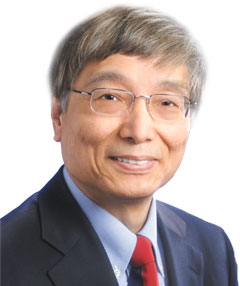Albert Chen
Founder of Telamon Corporation and the Asian American Alliance
Albert Chen overcame the challenges of being a first-generation immigrant to found a global telecommunications company and several philanthropic organizations that serve the underrepresented AAPI community.
Despite his remarkable success in the telecommunications industry and numerous philanthropic efforts, Albert M. Chen remains a humble man—often humorously referring to himself as just a simple “taxi driver.” This, of course, is a vast understatement of his legacy and impact, but Chen’s modest self-deprecation remains a testament to his down-to-earth, altruistic nature.
Albert Chen’s success story truly begins back in 1979, when he moved to Indianapolis from the West Coast. His initial reaction to Indiana was one of surprise and mild bewilderment, surrounded by cornfields as far as the eye could see. With no mountains and no ocean, he wondered why he’d chosen to live in such a place. But that fleeting impression was quickly overshadowed by the warmth and friendliness of the Hoosier community.
“The reason I moved here was because the people were so nice,” said Chen. “The culture of Indianapolis is very friendly—a small-town environment where people are willing to help, compared to other big cities where people don’t care about you or greet you as a neighbor.”

Telamon Corporation HQ is located in Carmel, Indiana. Photo via Facebook.
Chen spent over a decade working for GTE, until 1985 when he first ventured into the entrepreneurial world. He had just returned to Taiwan to give a speech about the U.S. telecommunications industry, when he was overcome by inspiration—a desire to create something meaningful on his own terms. This marked the inception of the Telamon Corporation, a telecommunications service supplier that has since expanded to three continents.
As the founder of Telamon, Albert Chen has made a significant impact on both the global industry and the local economy. But his passion for entrepreneurship extends beyond the corporate sector to the more charitable world of nonprofits.
Chen’s philanthropic spirit was ignited in 1971 by a small scholarship he received from Portland State. In that moment, he understood that it’s not about how much money one possesses; but rather how much one can share. This realization inspired him to create a variety of nonprofits to support underserved communities in Indianapolis. He established numerous scholarship funds for AAPI and minority communities to attend institutions like Butler, Purdue, Portland State, Vincennes and Indiana University. Moreover, recognizing a need for more arts and music funding, he established a foundation to support local youth here in Indianapolis.
As a first-generation Taiwanese immigrant, Albert Chen also made an effort to establish local nonprofits dedicated to uplifting the Asian American community in Indiana. In the 1980s, Chen realized that Asian Americans were significantly underrepresented in local managerial positions. That’s why he founded organizations like the Asian Learning Center, the Asian American Alliance and the America China Society of Indiana to help bridge the gap.

Asian American Alliance. Photo via Facebook.
These initiatives empower Asian American Hoosiers to share their culture with the larger community. But they also provide a supportive network of resources to help them build leadership skills, connect with the community and ultimately thrive here in Indiana.
This profound work in the international community encouraged Diane Thomas, former CEO of The International Center, to reach out to Chen, asking if he would be willing to join the board. Chen agreed and used his position to help expand The Center’s trade and business programming for future generations.
Now, looking back on the city’s transformation into a bustling international hub, Chen feels optimistic about the future of Indianapolis. He’s seen how Hoosier hospitality and religious values have led to greater cultural acceptance in the city, and he takes pride in knowing that the next generation is carrying that legacy forward.
As for how he wishes to be remembered, Chen remains characteristically modest. He likens himself to “a piece of paper in the river, continuing to flow, nobody knows where it’s going.” Yet, his contributions to Indiana and the telecommunications industry have left an indelible mark, making him a key figure in the state’s growth and cultural evolution.



